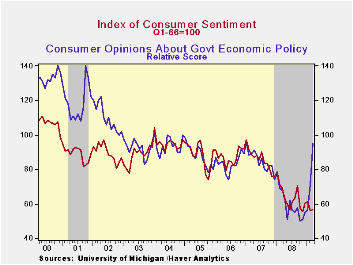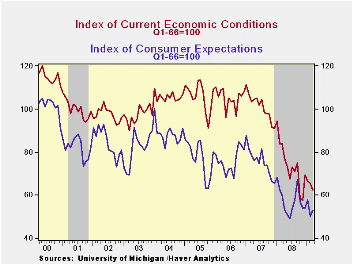 Global| Mar 13 2009
Global| Mar 13 2009Michigan Consumer Sentiment Stays Stable; Opinion of Government Jumps
by:Tom Moeller
|in:Economy in Brief
Summary
The earlier souring of consumers' moods seems to have stabilized. The University of Michigan reported that its reading of consumer sentiment held steady in early March with its February level. In fact, sentiment has moved roughly [...]

The earlier souring of consumers' moods seems to have stabilized. The University of Michigan reported that its reading of consumer sentiment held steady in early March with its February level. In fact, sentiment has moved roughly sideways since the summer, punctuated by a brief spike in the fall. Nevertheless the March reading of 56.6 was near the lowest since 1980. The latest figure was down 18.6% from last March but the reading came in slightly above Consensus expectations. During the last ten years, there has been a 62% correlation between the level of sentiment and the three-month change in real personal consumption expenditures.
The expectations component of consumer sentiment firmed a bit and recovered nearly half of the February decline. Expectations for business conditions during the next year led that increase but remained near the lowest level since 1980. Expectations for conditions during the next five years were about unchanged m/m. The expected change in personal finances also fell back to the lowest level since last June with a sharp 9.6% decline.
The current economic conditions index continued to move lower and was down by one-quarter during the last twelve months. Buying conditions for large household goods fell sharply to the lowest level since last November and remained down 22.6% from a year earlier. The view of current personal finances also fell and remained down by one-half from early 2007.
The opinion of government policy, which may eventually influence economic expectations, improved sharply to the highest level since January of 2007. Twenty three percent of respondents thought that a good job was being done by government, up from the four percent low of last December, while a much reduced twenty eight percent thought that a poor job was being done.
Inflation expectations for the next year were about stable at 2.4%. They were as high as 7.0% last May. The range of expectations is from slight price deflation to a 5.3% increase in prices. The expected inflation rate during the next five years reversed most of the increases during the last two months and fell to 2.9%.
The University of Michigan survey data is not seasonally adjusted. The reading is based on telephone interviews with about 500 households at month-end; the mid-month results are based on about 300 interviews. The summary indexes are in Haver's USECON database with details in the proprietary UMSCA database.
| University of Michigan | Mid-March | February | January | March y/y | 2008 | 2007 | 2006 |
|---|---|---|---|---|---|---|---|
| Consumer Sentiment | 56.6 | 56.3 | 61.2 | -18.6% | 63.8 | 85.6 | 87.3 |
| Current Conditions | 62.3 | 65.5 | 66.5 | -26.0 | 73.7 | 101.2 | 105.1 |
| Expectations | 53.0 | 50.5 | 57.8 | -11.8 | 57.3 | 75.6 | 75.9 |
Tom Moeller
AuthorMore in Author Profile »Prior to joining Haver Analytics in 2000, Mr. Moeller worked as the Economist at Chancellor Capital Management from 1985 to 1999. There, he developed comprehensive economic forecasts and interpreted economic data for equity and fixed income portfolio managers. Also at Chancellor, Mr. Moeller worked as an equity analyst and was responsible for researching and rating companies in the economically sensitive automobile and housing industries for investment in Chancellor’s equity portfolio. Prior to joining Chancellor, Mr. Moeller was an Economist at Citibank from 1979 to 1984. He also analyzed pricing behavior in the metals industry for the Council on Wage and Price Stability in Washington, D.C. In 1999, Mr. Moeller received the award for most accurate forecast from the Forecasters' Club of New York. From 1990 to 1992 he was President of the New York Association for Business Economists. Mr. Moeller earned an M.B.A. in Finance from Fordham University, where he graduated in 1987. He holds a Bachelor of Arts in Economics from George Washington University.
More Economy in Brief
 Global| Feb 05 2026
Global| Feb 05 2026Charts of the Week: Balanced Policy, Resilient Data and AI Narratives
by:Andrew Cates






